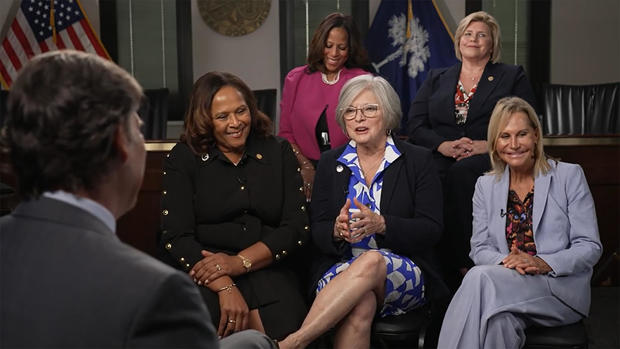South Carolina's "Sister Senators" on finding common ground
If the walls of Sandy Senn's office could talk, they might not have much to say anymore. The South Carolina State Senator is stripping them of their memories. Meanwhile, Senator Katrina Shealy has her 12-year political career all crammed into cardboard boxes. And we found freshman Senator Penry Gustafson sorting through emails from her soon-to-be former constituents.
All three lost in their primaries this past June.
Asked if she thinks she will get back into politics, Gustafson replied, "I don't know."
Earlier this summer the three said their goodbyes in the South Carolina Senate Chamber. "My farewell is conflicted, because I don't want to go," Gustafson said.
Shealy told her soon-to-be-former colleagues, "We've helped women and we've helped veterans, and what I'm so worried about is, who is going to do that now?"
Senn was firm: "I don't regret a single vote that I ever took," she said, "and I would make the vote again."
That vote, in opposition of the state's near-total ban on abortion, would be of little surprise if it came from Democrats. But these three are all members of the GOP.
"I'm a Republican, I think!" Shealy said. "I'm not sure right now, do they claim me or not?"
Gustafson said, "If you look at my voting record, there's no doubt I'm a red R, but that one vote makes be a RINO baby-killer."
"Republican In Name Only" – they heard that a lot. They didn't just buck their party; they reached across the aisle to Margie Bright Matthews, a Democrat, and Mia McLeod, an Independent. "I'm super-proud of my sisters," McLeod said, "because they knew what was at stake, they knew what they stood to lose, and they did it anyway."
This unusual coalition, on three separate occasions, successfully filibustered an abortion ban, halting its passage. Not that they agreed on everything (they didn't), but as women and mothers, they agreed that banning an abortion at six weeks was time too little. Gustafson explained to the Senate, "We do not know when we're pregnant, when we get pregnant."
"If we didn't say it on the floor, it wasn't going to be heard," Gustafson told "Sunday Morning."
On the Senate floor Bright Matthews declared, "This bill is about control, using the Bible to say that you can control my body."
"I'd say things just to rattle the men," Bright Matthews laughed. "Like, 'Wouldn't you want your side piece to be able to get an abortion?' And then all the older men just looked at me like, You don't say things like that!"
Shealy told the 46-member Senate (41 of whom were male), "Maybe the men who wrote it know more about pregnancy than the women in this chamber who can actually get pregnant and give birth."
Asked when they knew they were jeopardizing their political careers by filibustering the abortion bill, Shealy replied, "I knew it at the time I said it, because my party was, like, calling me and screaming at me."
"Two hours before the vote, I was pulled off the floor, and had a very strong, intense conversation: 'This could be a career-ending vote,'" Gustafson said.
Senn said, "I didn't care. I had to look myself in the mirror."
They were the only five women in the Senate, in a state that, they say, has often left women behind. Shealy said, "In 1920 they gave women the right to vote. Well, South Carolina didn't ratify that 'til 1969, and then we didn't put it into law until 1973. We are just a little behind."
The filibusters were their versions of "mansplaining." Bright Matthews said, "When someone makes a statement, 'Well, if you're raped or you get pregnant as the result of incest, it's not the child's fault; you just need to learn to love on the baby'?"
McCleod added, "That same senator held up a woman's picture and said she told him she was 'grateful' to have been raped, because it was the only opportunity God gave her to conceive a child. And I almost lost it. As a survivor of sexual assault … there are no words."
They didn't have words for the level of anti-abortion pushback, either; taunts, personal attacks, odd gifts left in their offices, like spines that came with a note warning them to "grow one."
Shealy took her gifted spine to the Senate floor and said, "I've got one hell of a spine already, but now I've got another backup!"
It got more intense, and even more disturbing. According to Shealy, "We had one gentleman – I'm not sure we can call him that – stands at the top of the escalator every day, and he preaches to us, he has his Bible."
"Swings a baby around with a rope, noose around its neck," added Senn.
The same man went to Shealy's church, calling her a "baby killer." "And she's singing in the choir while he's doing this," Senn said.
Shealy also said she had her tires slashed, and a window in her home shot with a pellet gun. "My kids and grandkids were seeing that," she said. "I'm glad I'm not going to be in politics, because politics are mean."
In May of last year, the "Sister Senators" could no longer hold off the vote on what is now the state's law: a six-week ban on abortion.
And yet, not all was lost. All five senators were recognized last year with the John F. Kennedy Profile in Courage Award. At the presentation ceremony Caroline Kennedy Schlossberg said, "We're fortunate to be able to gather to celebrate courageous leadership, which we need more than ever today."
Noting her award during her goodbye speech on the Senate floor, Shealy said, "I am proud of losing this Senate race, just to get this. Because I stood up for the right thing. I stood up for women, I stood up for children, I stood up for South Carolina."
According to Bright Matthews, the abortion restriction passed is not popular among the public. "The polling shows that 70+ percent of women in South Carolina do not want a total ban. All of us have stood up and agreed and tried to put forth a referendum to put it on the ballot; they said we can't."
Unlike 10 other states that will have abortion rights on the ballot in November (Arizona, Colorado, Florida, Maryland, Missouri, Montana, Nebraska, Nevada, New York and South Dakota), South Carolina doesn't allow voters that option.
What is clear is that post-Roe v. Wade, abortion rarely breaks down on clean partisan lines.
What the Sister Senators have shown is, it's in that grey area where compromise, while costly, may not be as endangered as we all think.
"Instead of just attack someone for feeling differently on an issue, it's better to ask why," said Bright Matthews.
Gustafson said, "In a world of politics where we're constantly being told we can't do that, or we shouldn't do that, and you're expected to be this way, we've just broke that political, social mores right in half."
"But, you paid the price for it," said Cowan.
"We paid the price for it, but look what we have right now," Gustafson said. "We have this national ear for the most wonderful thing of finding common ground, respect, civility in politics. That is what we gain, that is what America gains, from the Sister Senators of South Carolina."
For more info:
- John F. Kennedy Profile in Courage Award
- Photo by Nia J. Byas
Story produced by Deirdre Cohen. Editor: Ed Givnish.





